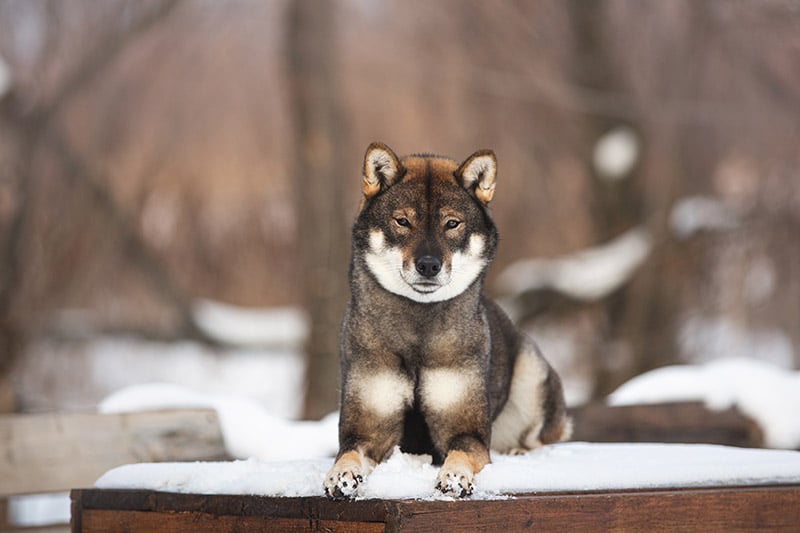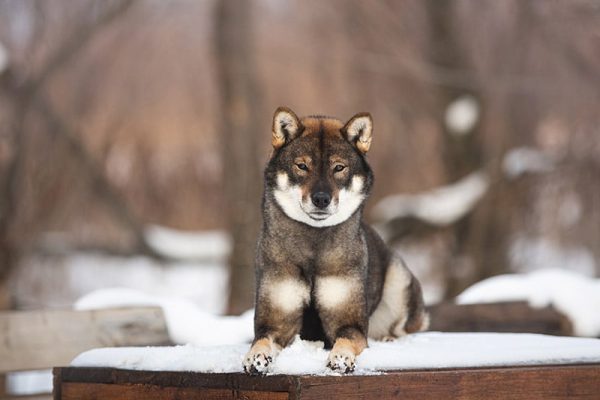Click Below to Skip Ahead
If you want to learn more about a dog with a rich history, look no further than the Shikoku dog. The Shikoku, also known as the Shikoku Inu, is a Japanese breed with distinct qualities. They were bred to hunt wild boar in the Kochi Prefecture, which is a mountainous region that requires strength and skill to traverse.
Breed Overview
Height:
17–22 inches
Weight:
35–55 pounds
Lifespan:
10–12 years
Colors:
Sesame, black sesame, red sesame
Suitable for:
Moderately active families, apartment living, experienced dog owners
Temperament:
Loyal, alert, energetic, enthusiastic
The Shikoku is native to Japan’s Shikoku Island, which has rugged, hilly terrain. The breed is believed to be the descendant of an ancient Japanese dog known as the Matagi dog, which was the hunting companion of the indigenous Ainu people. Although the breed’s numbers declined, the Shikoku was spared from extinction in the early 20th century.
Today, the Shikoku is a medium-sized dog with a muscular build. While they were bred for hunting, they are unwavering loyal to their loved ones. For an experienced dog owner, the Shikoku is an ideal family pet.
Shikoku Characteristics
Shikoku Puppies
Finding a Shikoku to adopt will likely be a challenge. Although they made a comeback in the 20th century, they’re not very common in the United States. Your best chance of bringing home a Shikoku puppy is to find a reputable breeder who specializes in the breed.
However, there is always a chance that a Shikoku was surrendered to your local animal shelter, so it never hurts to call a shelter first and see if any Shikokus need a loving home. Once you bring your Shikoku puppy home, you must be prepared to handle their exuberant energy.
While they may slightly mellow out with age, the Shikoku is a hunting dog with higher energy levels than the average dog. Providing your Shikoku dog with plenty of physical and mental stimulation should keep them occupied and prevent them from engaging in destructive behaviors.
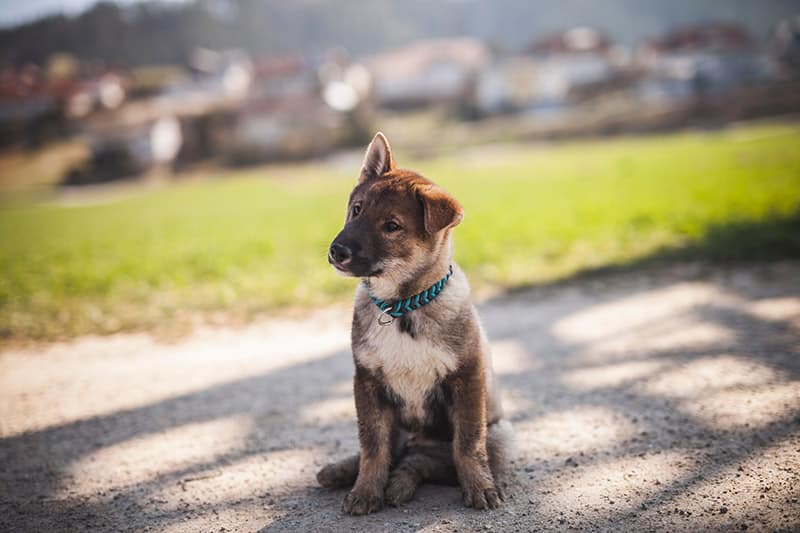
Temperament & Intelligence of the Shikoku
Shikoku dogs are alert, energetic companions with undying loyalty. Although they can be aloof at times, their enthusiastic side comes out around their closest friends and family. They are affectionate with their loved ones and willing to accept strangers into their inner circle, given enough time.
The Shikoku can sometimes be independent, and they’re challenging for a novice dog owner to train. Experienced dog owners are recommended for the Shikoku dog since they can provide the stability and structure needed to train the breed effectively.
The Shikoku can grow into a respectful, well-behaved dog with the proper socialization and training, but they’re strong-willed and clever. If you can handle their stubborn side and appeal to their intelligence, teaching the Shikoku dog can be a highly rewarding experience.
Are These Dogs Good for Families? 👪
The Shikoku is affectionate and good with children, assuming they have been properly trained and socialized. Because of their energetic nature, they’re not ideal for homes with small children, but they’re the perfect companion for older kids.
Shikokus are suitable for active families who spend much of their time outdoors since they’re hunting dogs that will get anxious if they’re cooped up inside all day.
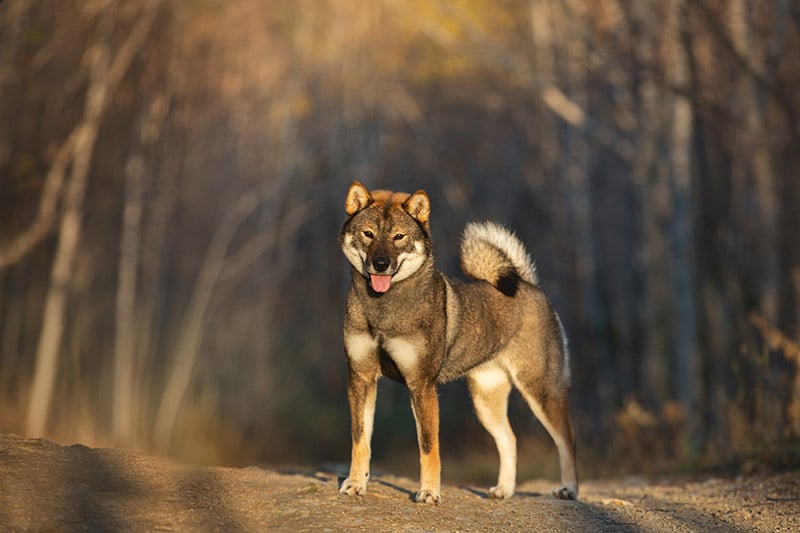
Does This Breed Get Along With Other Pets? 🐶 😽
Shikoku dogs can get along fine with other dogs and cats, but they’re unsuitable for homes with smaller animals like hamsters or guinea pigs. They have a strong prey drive, and they’re likely to chase and attack smaller mammals.
If you have other dogs or cats, introduce them to the Shikoku gradually. You can keep them in separate rooms at first, but you can allow them to eat meals on opposite sides of a closed door so they associate the new scents with a pleasant experience. Then, you can introduce them briefly every day to see how they react.
Shikoku puppies shouldn’t take long to befriend another pet, but it will take more time for adults to tolerate other animals.

Things to Know When Owning a Shikoku Dog:
The Shikoku is a magnificent breed, and many owners consider themselves lucky to raise and care for them. If you plan to own a Shikoku, you will want to learn everything there is to know about them, and we’ll discuss their diet, training, exercise, and training requirements below.
Food & Diet Requirements 🦴
Providing the Shikoku with high-quality food is important to ensure they receive the nutrients they need. They’re hard-working canines that need plenty of protein, fat, minerals, vitamins, and healthy carbs to fuel their lifestyles.
You can choose to feed your dog a commercial food or a home-prepared meal, but make sure that your veterinarian signs off on your dietary plan for your dog. To keep your Shikoku dog healthy and energetic, look for brands that are high in protein and rich in essential vitamins and minerals.
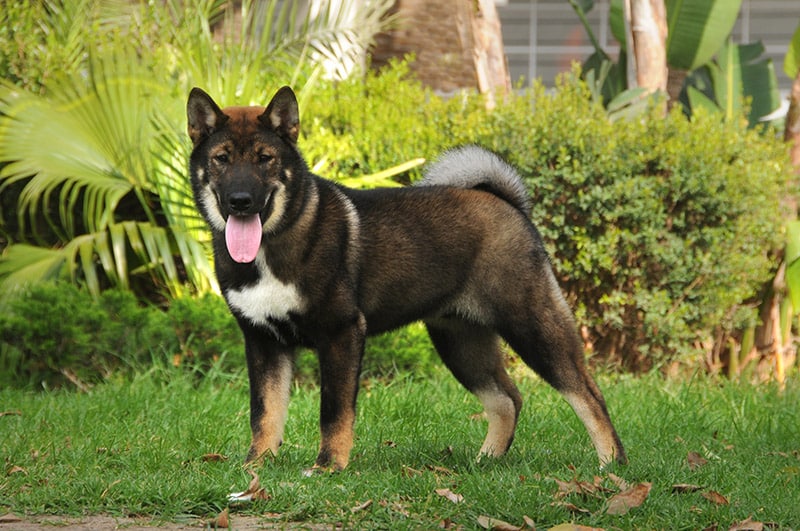
Exercise 🐕
Exercise is an important part of any dog’s daily routine, and the Shikoku dog is no exception. There are plenty of ways to keep your Shikoku dog active, such as playing fetch, going for long walks, and playing tug-of-war.
The best exercises allow your dog to play with you so they remain engaged, but the reserved Shikoku can also benefit from some alone time in a fenced-in backyard. Other activities your Shikoku dog can participate in include hide-and-seek, swimming, hiking, or jogging.
Training 🎾
Training is essential for the Shikoku. They can become stubborn and difficult to manage without early socialization and obedience training. Therefore, the Shikoku is not recommended for inexperienced dog owners since they need an owner who is confident in their training abilities.
Although the Shikoku can occasionally be self-willed, they still enjoy pleasing their owners. Dog owners who appeal to their intelligence and desire to please will find great success in their training efforts.
Punishments and harsh correction methods are not advised for the Shikoku since they can cause your dog to become fearful and disengage from the learning process. Instead, owners of the Shikoku should embrace positive reinforcement as an effective training tool, rewarding the behaviors they want to see.
Grooming ✂️
The Shikoku dog has a short double coat. During shedding season, your dog’s coat must be brushed more frequently to reduce shedding. Outside of shedding season, the Shikoku dog will benefit from weekly brushing and an occasional bath.
In addition to brushing and bathing, the Shikoku needs to have their nails maintained with a clipper or grinder. The frequency of maintenance varies from dog to dog, but their claws should be inspected frequently to ensure they stay trimmed and healthy.
You must also brush your dog’s teeth with canine toothpaste to prevent dental disease. Likewise, you should check your Shikoku’s ears weekly for signs of earwax buildup or an ear infection.
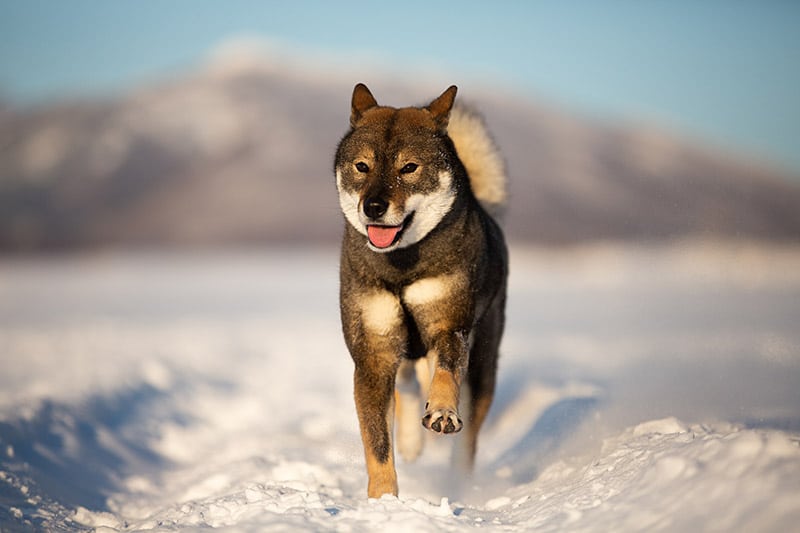
Health and Conditions 🏥
Shikokus are healthy dogs when cared for properly. When searching for your Shikoku, be sure you work with a responsible, ethical breeder who employs genetic testing to ensure their breeding stock isn’t likely to pass down genetic conditions.
Shikoku dogs are known to suffer from eye conditions, though they can range in severity. Common eye conditions include cherry eye and conjunctivitis, but retinal issues can also occur.
The Shikoku dog is also prone to relatively minor conditions that impact the joints, including hip dysplasia and patellar luxation.
- Hip dysplasia
- Luxating patella
- Eye conditions
Male vs Female
The differences between males and females of the breed are minimal, but the male is usually taller and heavier on average. The males and females have similar temperaments, and their personality is influenced more by their upbringing and environment than their sex.
Unfixed dogs can experience behavioral issues, and spaying or neutering your dog can reduce the likelihood of sex-related health issues such as testicular cancer. It’s best to consult your vet about the ideal time to have your Shikoku fixed.

3 Little-Known Facts About the Shikoku
1. Shikoku Dog Was Bred to Hunt Boar.
2. They Are Designed to Run Nimbly Through Rugged Terrain.
3. They Are Also Called Kochi-ken.

Final Thoughts
The Shikoku is a special breed with deep roots in Japanese history. They were bred to hunt wild boar, and they’re strong, courageous, and vigilant. While they can still be employed as hunting dogs, in modern times, the Shikoku is brought into the home as a companion. They are adept at both roles, and non-hunting families can also enjoy their company.
As wonderful as the Shikoku dog is, they are not recommended for first-time dog owners. Their strong will is admirable, but it makes them a challenge to train. Experienced dog owners can manage the Shikoku dog’s stubborn attitude and mold them into well-mannered, exemplary canine citizens.
The loyalty of this Shikoku cannot be overstated. If you are looking for a friend who will stand by you in the rain or shine, the Shikoku is the one for you.
Featured Image Credit: Anastasiia Cherniavskaia, Shutterstock

